Policy Advocacy Statement Task
VerifiedAdded on 2022/08/22
|6
|1713
|19
AI Summary
Contribute Materials
Your contribution can guide someone’s learning journey. Share your
documents today.
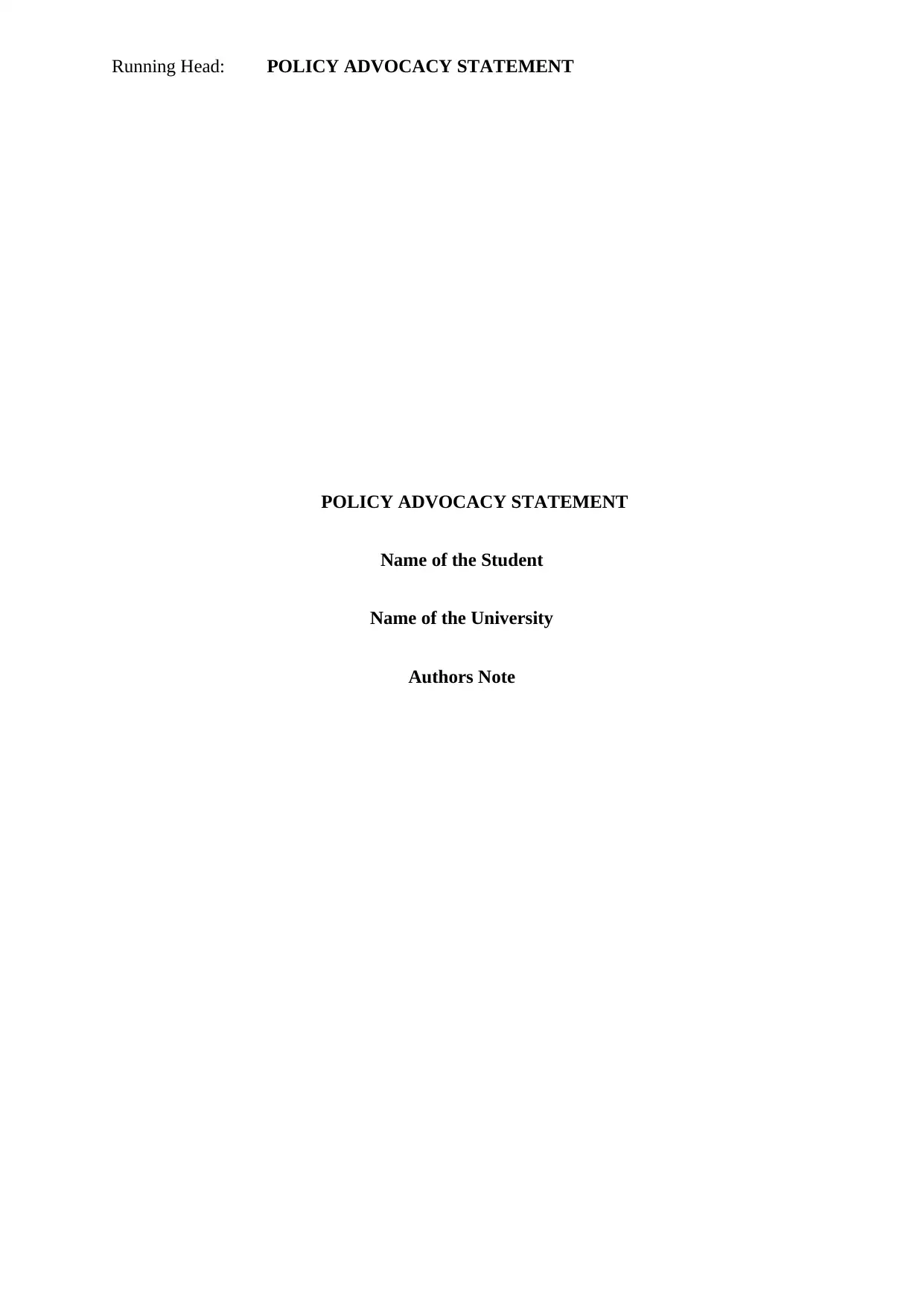
Running Head: POLICY ADVOCACY STATEMENT
POLICY ADVOCACY STATEMENT
Name of the Student
Name of the University
Authors Note
POLICY ADVOCACY STATEMENT
Name of the Student
Name of the University
Authors Note
Secure Best Marks with AI Grader
Need help grading? Try our AI Grader for instant feedback on your assignments.
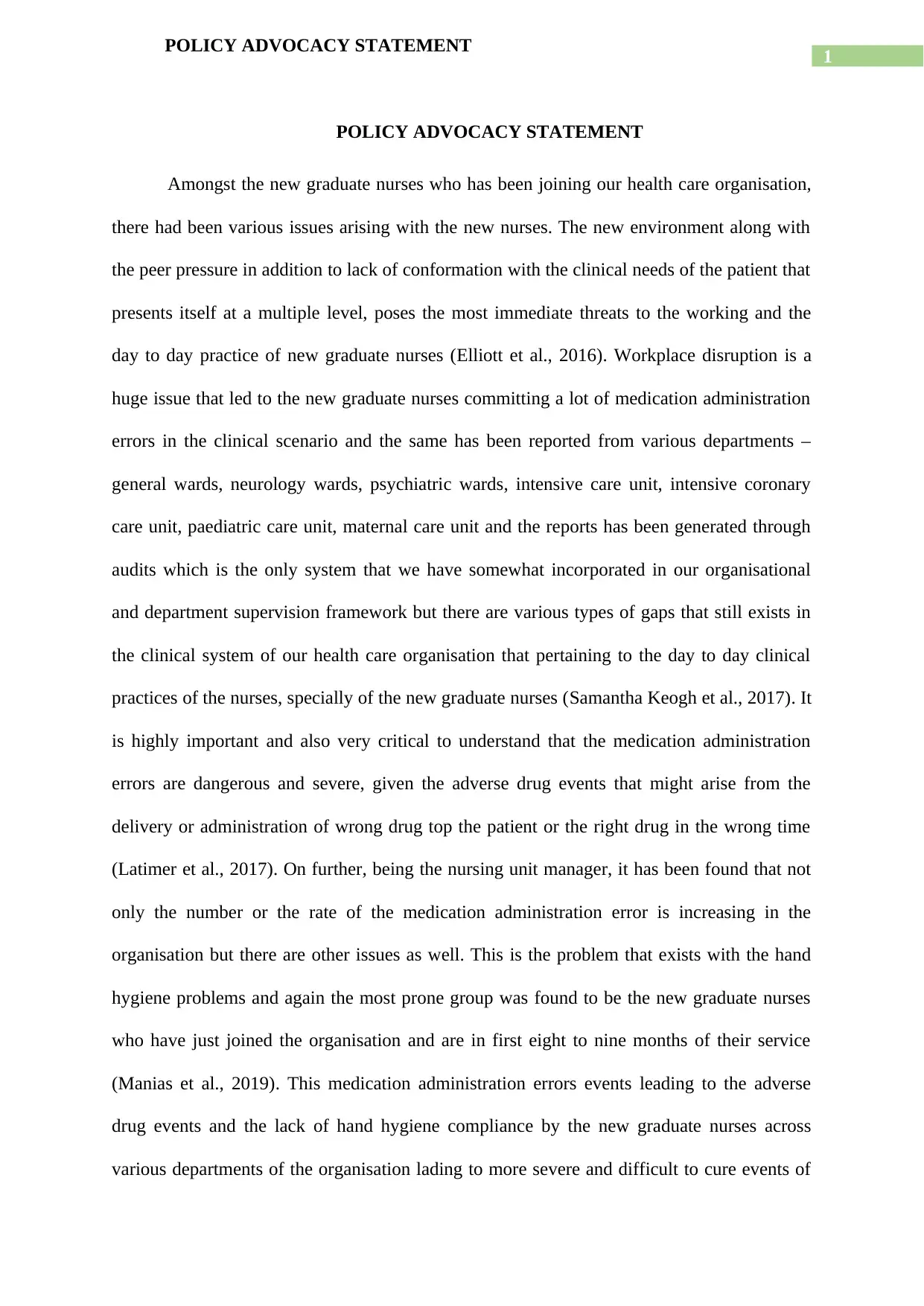
1
POLICY ADVOCACY STATEMENT
POLICY ADVOCACY STATEMENT
Amongst the new graduate nurses who has been joining our health care organisation,
there had been various issues arising with the new nurses. The new environment along with
the peer pressure in addition to lack of conformation with the clinical needs of the patient that
presents itself at a multiple level, poses the most immediate threats to the working and the
day to day practice of new graduate nurses (Elliott et al., 2016). Workplace disruption is a
huge issue that led to the new graduate nurses committing a lot of medication administration
errors in the clinical scenario and the same has been reported from various departments –
general wards, neurology wards, psychiatric wards, intensive care unit, intensive coronary
care unit, paediatric care unit, maternal care unit and the reports has been generated through
audits which is the only system that we have somewhat incorporated in our organisational
and department supervision framework but there are various types of gaps that still exists in
the clinical system of our health care organisation that pertaining to the day to day clinical
practices of the nurses, specially of the new graduate nurses (Samantha Keogh et al., 2017). It
is highly important and also very critical to understand that the medication administration
errors are dangerous and severe, given the adverse drug events that might arise from the
delivery or administration of wrong drug top the patient or the right drug in the wrong time
(Latimer et al., 2017). On further, being the nursing unit manager, it has been found that not
only the number or the rate of the medication administration error is increasing in the
organisation but there are other issues as well. This is the problem that exists with the hand
hygiene problems and again the most prone group was found to be the new graduate nurses
who have just joined the organisation and are in first eight to nine months of their service
(Manias et al., 2019). This medication administration errors events leading to the adverse
drug events and the lack of hand hygiene compliance by the new graduate nurses across
various departments of the organisation lading to more severe and difficult to cure events of
POLICY ADVOCACY STATEMENT
POLICY ADVOCACY STATEMENT
Amongst the new graduate nurses who has been joining our health care organisation,
there had been various issues arising with the new nurses. The new environment along with
the peer pressure in addition to lack of conformation with the clinical needs of the patient that
presents itself at a multiple level, poses the most immediate threats to the working and the
day to day practice of new graduate nurses (Elliott et al., 2016). Workplace disruption is a
huge issue that led to the new graduate nurses committing a lot of medication administration
errors in the clinical scenario and the same has been reported from various departments –
general wards, neurology wards, psychiatric wards, intensive care unit, intensive coronary
care unit, paediatric care unit, maternal care unit and the reports has been generated through
audits which is the only system that we have somewhat incorporated in our organisational
and department supervision framework but there are various types of gaps that still exists in
the clinical system of our health care organisation that pertaining to the day to day clinical
practices of the nurses, specially of the new graduate nurses (Samantha Keogh et al., 2017). It
is highly important and also very critical to understand that the medication administration
errors are dangerous and severe, given the adverse drug events that might arise from the
delivery or administration of wrong drug top the patient or the right drug in the wrong time
(Latimer et al., 2017). On further, being the nursing unit manager, it has been found that not
only the number or the rate of the medication administration error is increasing in the
organisation but there are other issues as well. This is the problem that exists with the hand
hygiene problems and again the most prone group was found to be the new graduate nurses
who have just joined the organisation and are in first eight to nine months of their service
(Manias et al., 2019). This medication administration errors events leading to the adverse
drug events and the lack of hand hygiene compliance by the new graduate nurses across
various departments of the organisation lading to more severe and difficult to cure events of
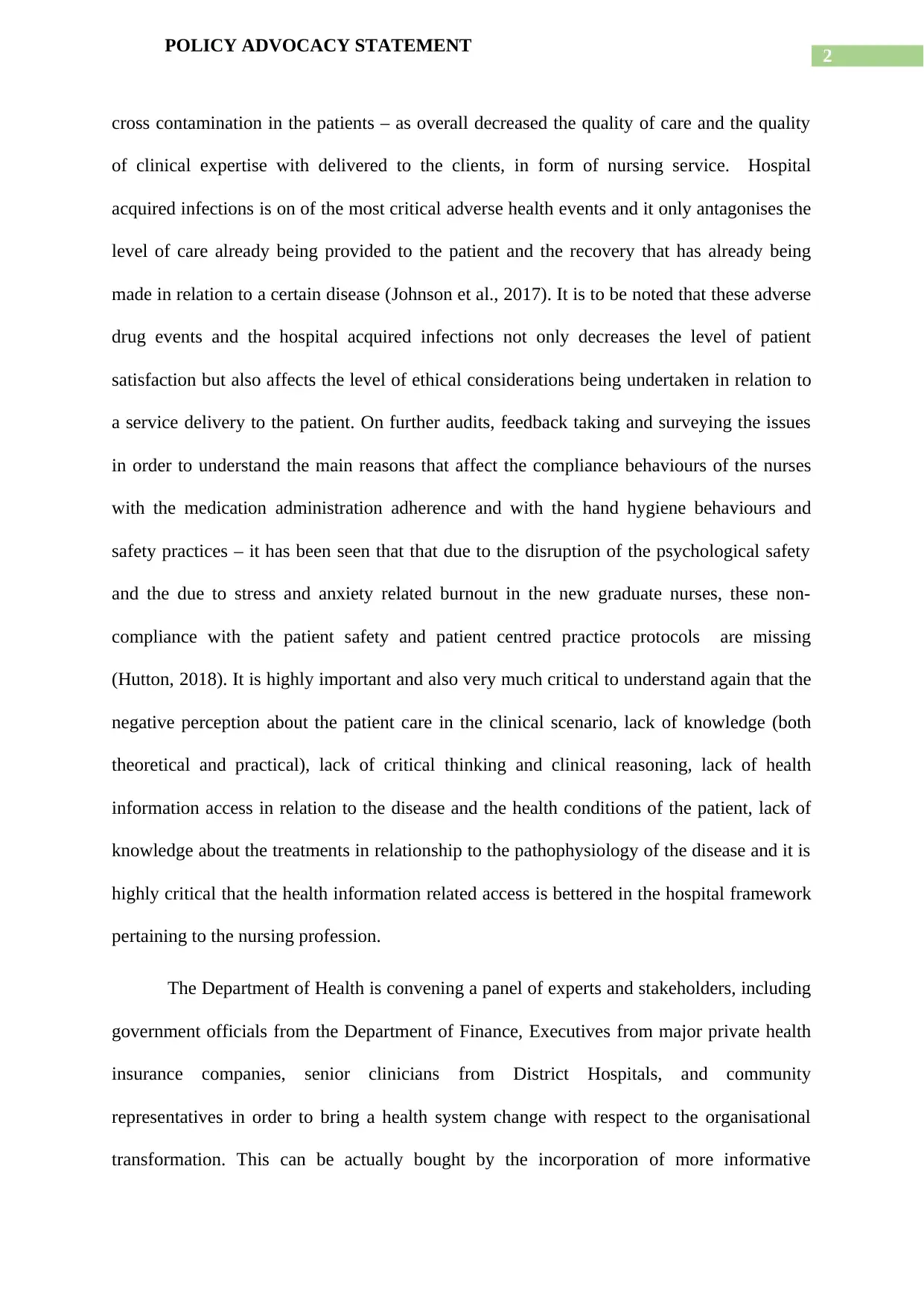
2
POLICY ADVOCACY STATEMENT
cross contamination in the patients – as overall decreased the quality of care and the quality
of clinical expertise with delivered to the clients, in form of nursing service. Hospital
acquired infections is on of the most critical adverse health events and it only antagonises the
level of care already being provided to the patient and the recovery that has already being
made in relation to a certain disease (Johnson et al., 2017). It is to be noted that these adverse
drug events and the hospital acquired infections not only decreases the level of patient
satisfaction but also affects the level of ethical considerations being undertaken in relation to
a service delivery to the patient. On further audits, feedback taking and surveying the issues
in order to understand the main reasons that affect the compliance behaviours of the nurses
with the medication administration adherence and with the hand hygiene behaviours and
safety practices – it has been seen that that due to the disruption of the psychological safety
and the due to stress and anxiety related burnout in the new graduate nurses, these non-
compliance with the patient safety and patient centred practice protocols are missing
(Hutton, 2018). It is highly important and also very much critical to understand again that the
negative perception about the patient care in the clinical scenario, lack of knowledge (both
theoretical and practical), lack of critical thinking and clinical reasoning, lack of health
information access in relation to the disease and the health conditions of the patient, lack of
knowledge about the treatments in relationship to the pathophysiology of the disease and it is
highly critical that the health information related access is bettered in the hospital framework
pertaining to the nursing profession.
The Department of Health is convening a panel of experts and stakeholders, including
government officials from the Department of Finance, Executives from major private health
insurance companies, senior clinicians from District Hospitals, and community
representatives in order to bring a health system change with respect to the organisational
transformation. This can be actually bought by the incorporation of more informative
POLICY ADVOCACY STATEMENT
cross contamination in the patients – as overall decreased the quality of care and the quality
of clinical expertise with delivered to the clients, in form of nursing service. Hospital
acquired infections is on of the most critical adverse health events and it only antagonises the
level of care already being provided to the patient and the recovery that has already being
made in relation to a certain disease (Johnson et al., 2017). It is to be noted that these adverse
drug events and the hospital acquired infections not only decreases the level of patient
satisfaction but also affects the level of ethical considerations being undertaken in relation to
a service delivery to the patient. On further audits, feedback taking and surveying the issues
in order to understand the main reasons that affect the compliance behaviours of the nurses
with the medication administration adherence and with the hand hygiene behaviours and
safety practices – it has been seen that that due to the disruption of the psychological safety
and the due to stress and anxiety related burnout in the new graduate nurses, these non-
compliance with the patient safety and patient centred practice protocols are missing
(Hutton, 2018). It is highly important and also very much critical to understand again that the
negative perception about the patient care in the clinical scenario, lack of knowledge (both
theoretical and practical), lack of critical thinking and clinical reasoning, lack of health
information access in relation to the disease and the health conditions of the patient, lack of
knowledge about the treatments in relationship to the pathophysiology of the disease and it is
highly critical that the health information related access is bettered in the hospital framework
pertaining to the nursing profession.
The Department of Health is convening a panel of experts and stakeholders, including
government officials from the Department of Finance, Executives from major private health
insurance companies, senior clinicians from District Hospitals, and community
representatives in order to bring a health system change with respect to the organisational
transformation. This can be actually bought by the incorporation of more informative
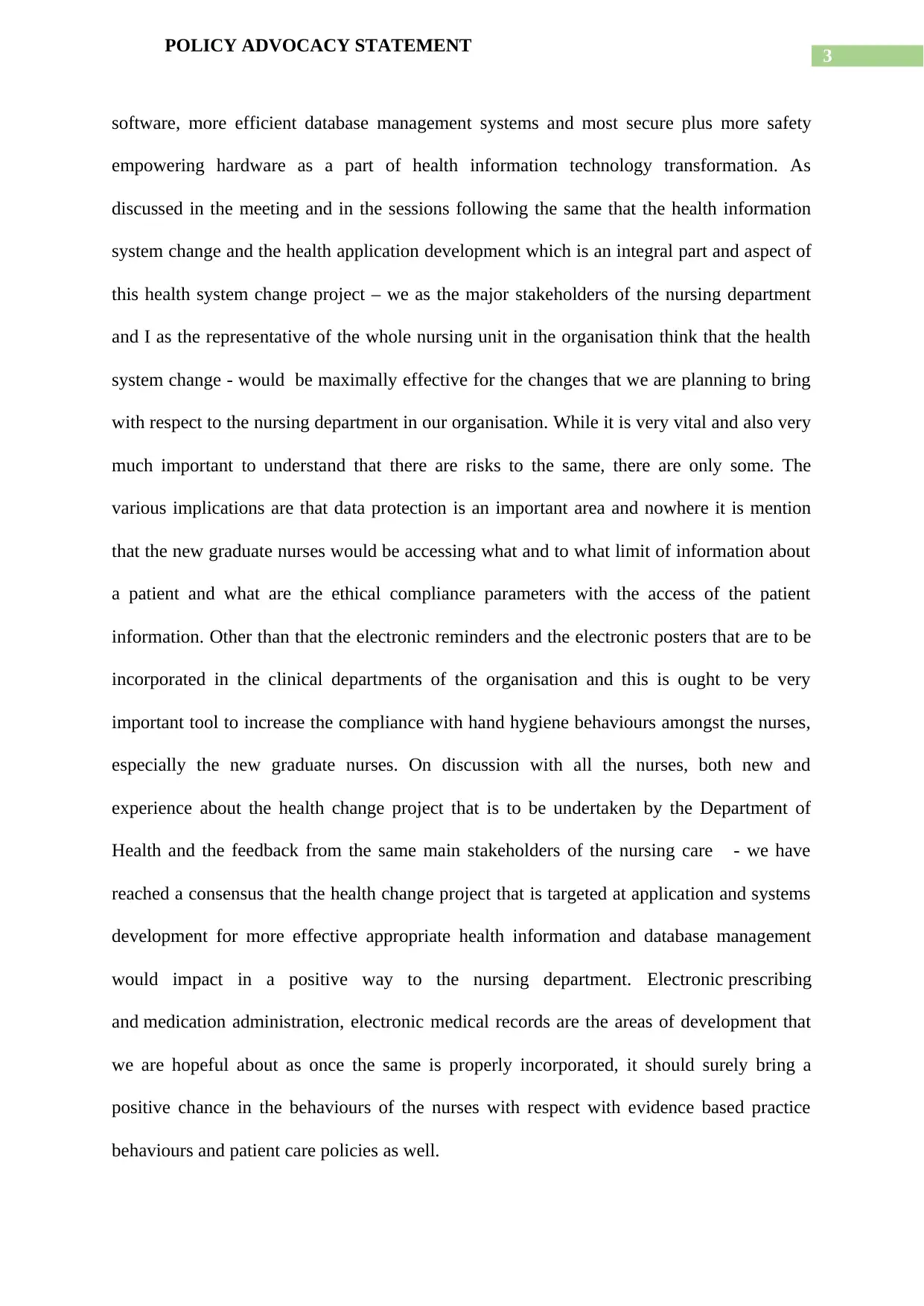
3
POLICY ADVOCACY STATEMENT
software, more efficient database management systems and most secure plus more safety
empowering hardware as a part of health information technology transformation. As
discussed in the meeting and in the sessions following the same that the health information
system change and the health application development which is an integral part and aspect of
this health system change project – we as the major stakeholders of the nursing department
and I as the representative of the whole nursing unit in the organisation think that the health
system change - would be maximally effective for the changes that we are planning to bring
with respect to the nursing department in our organisation. While it is very vital and also very
much important to understand that there are risks to the same, there are only some. The
various implications are that data protection is an important area and nowhere it is mention
that the new graduate nurses would be accessing what and to what limit of information about
a patient and what are the ethical compliance parameters with the access of the patient
information. Other than that the electronic reminders and the electronic posters that are to be
incorporated in the clinical departments of the organisation and this is ought to be very
important tool to increase the compliance with hand hygiene behaviours amongst the nurses,
especially the new graduate nurses. On discussion with all the nurses, both new and
experience about the health change project that is to be undertaken by the Department of
Health and the feedback from the same main stakeholders of the nursing care - we have
reached a consensus that the health change project that is targeted at application and systems
development for more effective appropriate health information and database management
would impact in a positive way to the nursing department. Electronic prescribing
and medication administration, electronic medical records are the areas of development that
we are hopeful about as once the same is properly incorporated, it should surely bring a
positive chance in the behaviours of the nurses with respect with evidence based practice
behaviours and patient care policies as well.
POLICY ADVOCACY STATEMENT
software, more efficient database management systems and most secure plus more safety
empowering hardware as a part of health information technology transformation. As
discussed in the meeting and in the sessions following the same that the health information
system change and the health application development which is an integral part and aspect of
this health system change project – we as the major stakeholders of the nursing department
and I as the representative of the whole nursing unit in the organisation think that the health
system change - would be maximally effective for the changes that we are planning to bring
with respect to the nursing department in our organisation. While it is very vital and also very
much important to understand that there are risks to the same, there are only some. The
various implications are that data protection is an important area and nowhere it is mention
that the new graduate nurses would be accessing what and to what limit of information about
a patient and what are the ethical compliance parameters with the access of the patient
information. Other than that the electronic reminders and the electronic posters that are to be
incorporated in the clinical departments of the organisation and this is ought to be very
important tool to increase the compliance with hand hygiene behaviours amongst the nurses,
especially the new graduate nurses. On discussion with all the nurses, both new and
experience about the health change project that is to be undertaken by the Department of
Health and the feedback from the same main stakeholders of the nursing care - we have
reached a consensus that the health change project that is targeted at application and systems
development for more effective appropriate health information and database management
would impact in a positive way to the nursing department. Electronic prescribing
and medication administration, electronic medical records are the areas of development that
we are hopeful about as once the same is properly incorporated, it should surely bring a
positive chance in the behaviours of the nurses with respect with evidence based practice
behaviours and patient care policies as well.
Secure Best Marks with AI Grader
Need help grading? Try our AI Grader for instant feedback on your assignments.
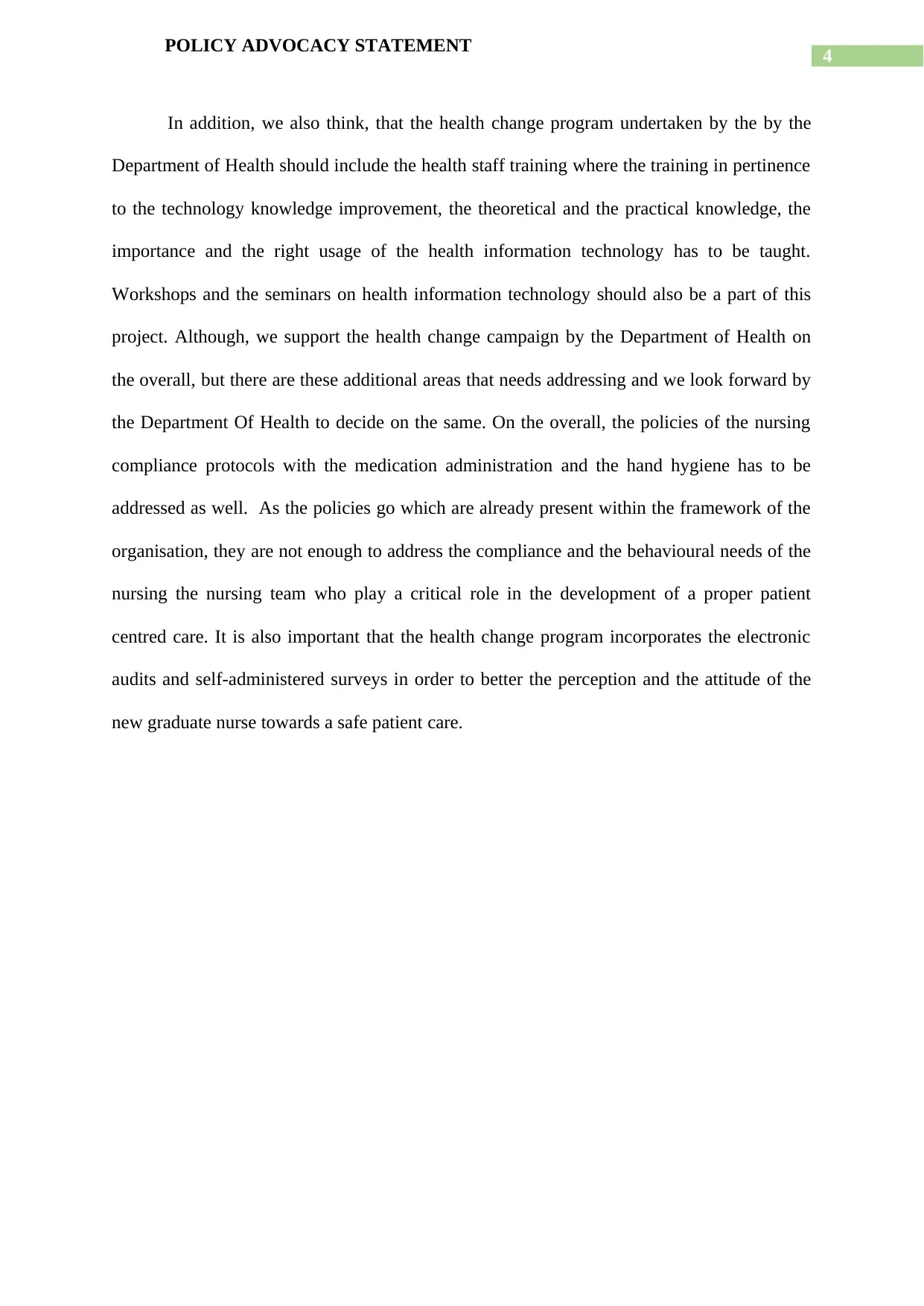
4
POLICY ADVOCACY STATEMENT
In addition, we also think, that the health change program undertaken by the by the
Department of Health should include the health staff training where the training in pertinence
to the technology knowledge improvement, the theoretical and the practical knowledge, the
importance and the right usage of the health information technology has to be taught.
Workshops and the seminars on health information technology should also be a part of this
project. Although, we support the health change campaign by the Department of Health on
the overall, but there are these additional areas that needs addressing and we look forward by
the Department Of Health to decide on the same. On the overall, the policies of the nursing
compliance protocols with the medication administration and the hand hygiene has to be
addressed as well. As the policies go which are already present within the framework of the
organisation, they are not enough to address the compliance and the behavioural needs of the
nursing the nursing team who play a critical role in the development of a proper patient
centred care. It is also important that the health change program incorporates the electronic
audits and self-administered surveys in order to better the perception and the attitude of the
new graduate nurse towards a safe patient care.
POLICY ADVOCACY STATEMENT
In addition, we also think, that the health change program undertaken by the by the
Department of Health should include the health staff training where the training in pertinence
to the technology knowledge improvement, the theoretical and the practical knowledge, the
importance and the right usage of the health information technology has to be taught.
Workshops and the seminars on health information technology should also be a part of this
project. Although, we support the health change campaign by the Department of Health on
the overall, but there are these additional areas that needs addressing and we look forward by
the Department Of Health to decide on the same. On the overall, the policies of the nursing
compliance protocols with the medication administration and the hand hygiene has to be
addressed as well. As the policies go which are already present within the framework of the
organisation, they are not enough to address the compliance and the behavioural needs of the
nursing the nursing team who play a critical role in the development of a proper patient
centred care. It is also important that the health change program incorporates the electronic
audits and self-administered surveys in order to better the perception and the attitude of the
new graduate nurse towards a safe patient care.
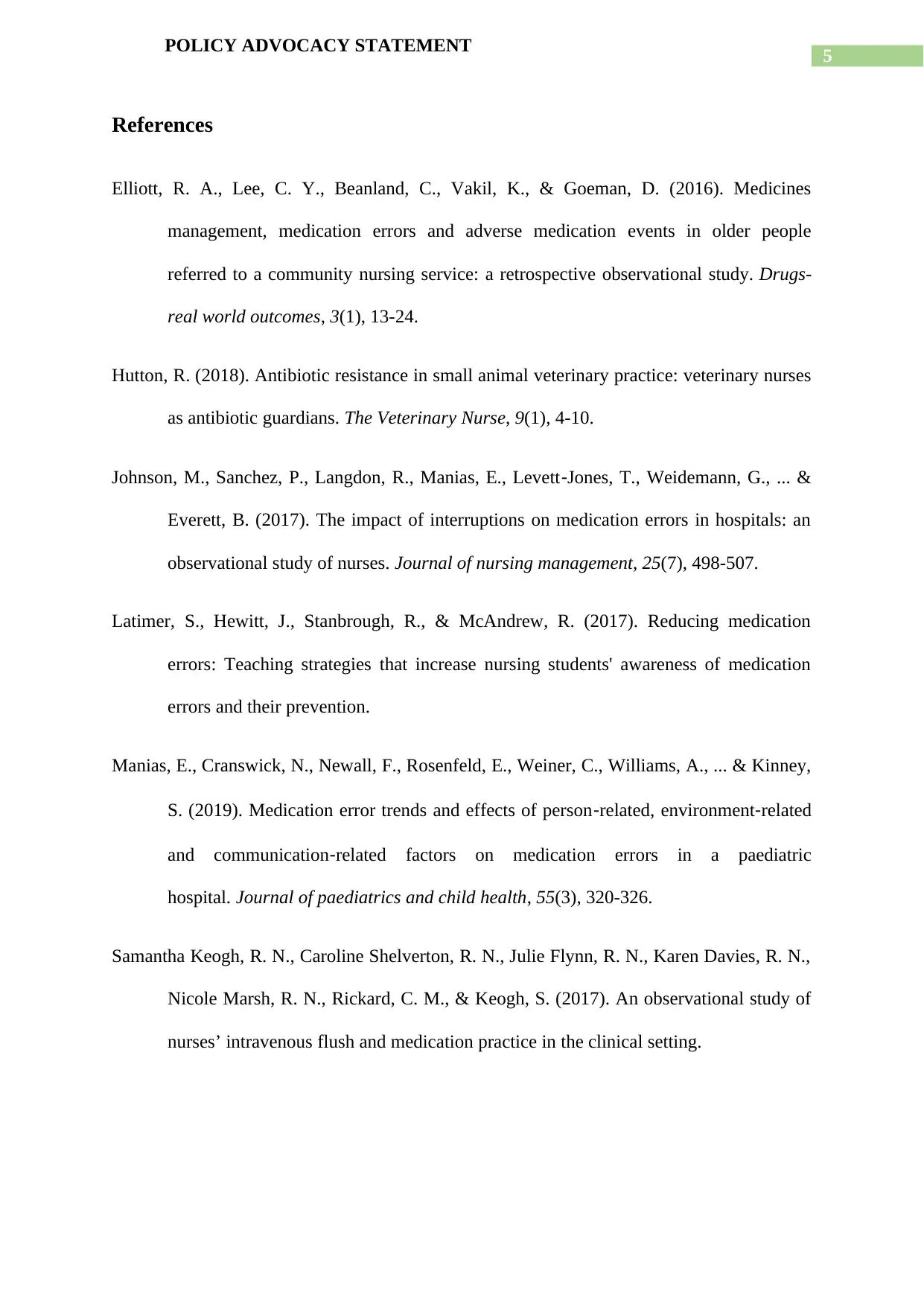
5
POLICY ADVOCACY STATEMENT
References
Elliott, R. A., Lee, C. Y., Beanland, C., Vakil, K., & Goeman, D. (2016). Medicines
management, medication errors and adverse medication events in older people
referred to a community nursing service: a retrospective observational study. Drugs-
real world outcomes, 3(1), 13-24.
Hutton, R. (2018). Antibiotic resistance in small animal veterinary practice: veterinary nurses
as antibiotic guardians. The Veterinary Nurse, 9(1), 4-10.
Johnson, M., Sanchez, P., Langdon, R., Manias, E., Levett‐Jones, T., Weidemann, G., ... &
Everett, B. (2017). The impact of interruptions on medication errors in hospitals: an
observational study of nurses. Journal of nursing management, 25(7), 498-507.
Latimer, S., Hewitt, J., Stanbrough, R., & McAndrew, R. (2017). Reducing medication
errors: Teaching strategies that increase nursing students' awareness of medication
errors and their prevention.
Manias, E., Cranswick, N., Newall, F., Rosenfeld, E., Weiner, C., Williams, A., ... & Kinney,
S. (2019). Medication error trends and effects of person‐related, environment‐related
and communication‐related factors on medication errors in a paediatric
hospital. Journal of paediatrics and child health, 55(3), 320-326.
Samantha Keogh, R. N., Caroline Shelverton, R. N., Julie Flynn, R. N., Karen Davies, R. N.,
Nicole Marsh, R. N., Rickard, C. M., & Keogh, S. (2017). An observational study of
nurses’ intravenous flush and medication practice in the clinical setting.
POLICY ADVOCACY STATEMENT
References
Elliott, R. A., Lee, C. Y., Beanland, C., Vakil, K., & Goeman, D. (2016). Medicines
management, medication errors and adverse medication events in older people
referred to a community nursing service: a retrospective observational study. Drugs-
real world outcomes, 3(1), 13-24.
Hutton, R. (2018). Antibiotic resistance in small animal veterinary practice: veterinary nurses
as antibiotic guardians. The Veterinary Nurse, 9(1), 4-10.
Johnson, M., Sanchez, P., Langdon, R., Manias, E., Levett‐Jones, T., Weidemann, G., ... &
Everett, B. (2017). The impact of interruptions on medication errors in hospitals: an
observational study of nurses. Journal of nursing management, 25(7), 498-507.
Latimer, S., Hewitt, J., Stanbrough, R., & McAndrew, R. (2017). Reducing medication
errors: Teaching strategies that increase nursing students' awareness of medication
errors and their prevention.
Manias, E., Cranswick, N., Newall, F., Rosenfeld, E., Weiner, C., Williams, A., ... & Kinney,
S. (2019). Medication error trends and effects of person‐related, environment‐related
and communication‐related factors on medication errors in a paediatric
hospital. Journal of paediatrics and child health, 55(3), 320-326.
Samantha Keogh, R. N., Caroline Shelverton, R. N., Julie Flynn, R. N., Karen Davies, R. N.,
Nicole Marsh, R. N., Rickard, C. M., & Keogh, S. (2017). An observational study of
nurses’ intravenous flush and medication practice in the clinical setting.
1 out of 6
Related Documents
Your All-in-One AI-Powered Toolkit for Academic Success.
+13062052269
info@desklib.com
Available 24*7 on WhatsApp / Email
![[object Object]](/_next/static/media/star-bottom.7253800d.svg)
Unlock your academic potential
© 2024 | Zucol Services PVT LTD | All rights reserved.





